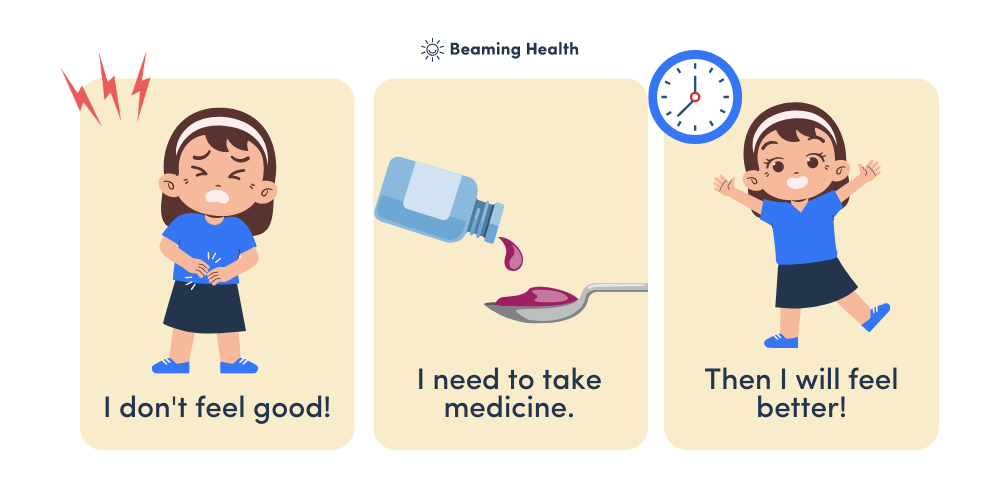Autism texture sensitivity: Get your child to take medicines
Updated: September 10, 2023 · 7 Minute Read

Reviewed by:
Jaime Kaley Perez, M.S., CCC-SLP, owner of Thriving Joy Pediatric Therapy
Highlights
- Many autistic kids have acid reflux, a swallowing disorder, or a motor planning challenge.
- Many autistic adults say that pills are easier because there’s less chance of funky tastes or textures. Some kids may prefer liquid or chewable tablets.
- While many doctors may recommend hiding medicine for autistic kids, it’s not the best game plan long term.
- If your child has to take medication daily, or if they’re sick and need medicine every few hours, set a timer.
For many autistic kids, taking medicine is difficult. As a parent, it’s hard to watch your child suffer and not be able to get the medicine into them they need to feel better. Let’s talk about why taking medicine is hard for autistic kids, and how you can help your child overcome it!
Why do autistic children struggle with taking medicine?
Nobody likes taking medicine, but kids on the spectrum can have some extra barriers to taking the meds they need. It’s probably not that your child doesn’t want to take their medicine — they want to feel better! It’s more likely that your child can’t take the medicine. Here are some common reasons kids with autism have trouble taking medicine:
- Sensory concerns. Taste, texture/mouthfeel, look of the medicine, and smell can play a role. Those with sensory sensitivities often have difficulty with the textures, tastes, and look of certain foods.2 This applies to medicine, too!
- Feeding or swallowing disorders. GERD (Gastroesophageal reflux disease AKA acid reflux) and dysphagia (swallowing disorder) are common in autistic kids.3,4,6
Feeding/swallowing disorders make it difficult for kids to take medicine or enjoy regular mealtimes. Gastrointestinal upset like acid reflux can go unnoticed by doctors, but can show up in your child’s behavior.1 Autistic kids with stomach problems also had increased anxiety.5 If you’re frustrated with your child’s behavior, consider that it may be their way of communicating tummy pain.
Signs of a feeding or swallowing disorder can include: frequently coughing/choking/gagging during or after eating or drinking; refusing to eat or drink during meal times (even when in distress); pain/discomfort while swallowing; frequent respiratory infections or pneumonia, and more. If you’re concerned your child may have a feeding or swallowing disorder, it’s best to consult with a gastroenterologist (stomach doctor) or a speech therapist with training in feeding and swallowing. They might prescribe swallowing exercises to try at home.
- Anxiety/fear. Some kids may be resistant to take medicine because they had a bad experience before. If a medicine they took in the past made them throw up or tasted bad, it could make them afraid to take a similar-looking med now. They may be worried about those sensory concerns like how the medicine will taste or feel. This is especially true if it’s a new medicine your child hasn’t had before.
- Oral motor concerns. Some neurodivergent kiddos also have motor planning challenges or dyspraxia (also called DCD — developmental coordination disorder). This can cause problems in coordination between the jaw, tongue, lips, and mouth, making swallowing difficult. If you suspect your child has dyspraxia or other oral motor concerns, you’ll need to reach out to their health care team for guidance.
- Change. Being sick and taking medicine is a huge change in your child’s regular routine. Many autistic and neurodivergent kids thrive on routine and predictability because it helps reduce their anxiety. Your child may be resistant to taking medicine because it’s simply something they don’t do regularly. This can be true even if your child takes certain medications everyday, because the medicines they take while sick can be different.

Tips for helping your child take medicine
- Communicate with your child. Explain to them what the medicine is for and what it will help them with. This is important, especially for nonverbal children. Use simple language your child can understand: “Medicine will make your tummy better!”
- Use visual aids. You can create social stories, use videos and pictures, to show your child how to take medicine. These visual aids can show when they’ll take medicine, how to take medicine, and what it’s for. You can use the image we created above to explain to your child how medicine will help them get better.
- Ask your child what type of medicine is easiest for them. Your child may prefer pills, liquids, or chewable tablets. You may notice your child’s preference through trial and error if they can’t verbalize or aren’t sure yet. Your child may prefer one kind for one type of medicine and another for others. For example, your child may prefer allergy meds in a chewable form, but may like pain relievers in liquid form.
- Create a system. My child and I have a system for taking medicine. When I introduce a new medicine, I explain to him what it’s for. “This is for your nose,” (allergy medicine), “This is for your teeth/head,” (pain reliever). He knows the colors of each medicine, “pink” is his allergy medicine, “white” is his pain reliever, and so on. When he has a stuffy nose, I say, “Do you want pink?” or when he has a headache, toothache, etc., I say, “Do you need white?” It took a few weeks, but now he actually asks for medicine by name! This is our system, and it works great for us. Your family’s system may look different than ours. What matters is your child having a predictable way to take medicine, and understanding what it’s for.
- Make the medicine taste better. This is something we need to be careful about — we don’t want to make medicine too appetizing, for safety reasons. But we can do our best to “take the edge off” by requesting custom flavors at the pharmacy, or choosing flavors our kiddos like. Some pharmacies even allow your child to choose their own flavor! Allowing your child to pick their medicine’s flavor is a great way to help them feel in control and reduce anxiety. If you choose to mix your child’s medicine with food or juice to make it taste better, be honest with your child. For example, “Would it help if I put your medicine in juice?”
- Reward your child. You can use a sticker chart or a treat to reward your child for taking their medicine. You don’t want to rely too much on rewards, but it can be helpful, especially if your kiddo has to take medicine daily. Taking medicine isn’t a fun task, so praising your child and making it fun can make it less daunting.
- Give clear instructions. Many autistic and neurodivergent kids struggle with daily tasks because they need them broken down into simpler steps. Their brains process more information and sometimes it takes a little longer to get the hang of things. Be patient with your child and explain each step in simple language. For example, “Put the pills in your mouth. Take a sip of water. Swallow.” If you are administering the medicine to your child, explain what you’re doing as you’re doing it, and again, reiterate what the medicine is for.
- Try using an oral syringe or dropper for liquid medicine. Some parents and kids find this method easier than using the little plastic cup that comes with some medicines. My son loved using an oral syringe until he was about 4. Then he went through a phase where he only wanted chewable medicine. At almost 6, now he proudly uses the plastic measuring cup like a big boy! Sometimes it’s not the medicine itself, it’s the delivery method!
- Model medicine taking. Show your child that the medicine is harmless by taking some yourself! You can use big facial expressions and hand movements to show your child you’re “feeling all better.” Some recommend practicing with your child using placebos to get them used to the idea of taking medicine. This may feel confusing or deceptive to some kids, so it wouldn’t be our first choice.
- Set a timer. If your child has to take medication daily, or if they’re sick and need medicine every few hours, set a timer. You can use a visual timer or set a regular timer on your phone. When the timer goes off, it will alert your child that it’s time to take medicine again. You can say something like “Medicine time! It’s time to take your tummy medicine.” Use a happy tone and a special ringtone. Knowing when the moment is coming can make the transition easier for your child.
- Be patient with your child. It’s so frustrating to see our kiddos in pain and not be able to give them the medicine they need to get better. But be patient with your child and try to remain calm. Speak in soothing tones, and calmly explain that you’re trying to help them. It may take your child a while to make the connection that medicine helps them feel better. Keep being consistent and open in your communication, using visuals, and eventually your kiddo will get the hang of it.
- If your child still isn’t taking their medicine as needed, it might be time to ask for help. Try calling the nursing hotline provided by your pediatrician or insurance provider to get advice. If your child’s condition gets worse, you may need to take them to the ER or seek emergency help. Some medicines, like antibiotics, are extra hard for autistic kids to take (usually because of the taste). In some instances you really just can’t get the medicine into your kiddo by yourself at home. Work with your child’s doctor to come up with a solution. They can try a different brand of medicine, a different dosage, or a different delivery method (like a shot). Your pharmacist may also have some suggestions.
- Please avoid holding your child down to give them medicine. This can be traumatic for your child. I have done this in the past and regret it. We do the best we can in the moment with the information we have. Please learn from my mistakes!
- Stay positive and calm. It’s so hard to feel hopeful when you’re watching your child suffer. But it’s important to remain kind, calm, and as upbeat as possible. You want taking medicine to be a positive experience for your child. When your child is sick, you’re likely not getting rest yourself, which makes it harder to regulate. Your child will also have a hard time regulating when they’re sick. Practice regulation strategies like breathing to help you get through tough moments. Be your child’s peace, so they can draw off of your positive and calm energy.
Conclusion
It’s hard to watch your child struggle and not be able to take the medicine they need to feel better. Removing some of the anxiety around medicine-taking by creating a schedule, using visual aids, and communicating openly with your child, can help them take medicine. Making the medicine taste better is another way to make taking medicine easier for your child. For more info, check out the deep dives below, as well as our guide to the most common medications prescribed to autistic kids.
Get our best articles delivered to your inbox each month.
We respect your privacy.
Dive Deeper
Article References
- Buie T, Fuchs GJ 3rd, Furuta GT, et al. Recommendations for evaluation and treatment of common gastrointestinal problems in children with ASDs. Pediatrics. 2010;125 Suppl 1:S19-S29. doi:10.1542/peds.2009-1878D
- Nimbley E, Golds L, Sharpe H, Gillespie-Smith K, Duffy F. Sensory processing and eating behaviours in autism: A systematic review. Eur Eat Disord Rev. 2022;30(5):538-559. doi:10.1002/erv.2920
- Ibrahim SH, Voigt RG, Katusic SK, Weaver AL, Barbaresi WJ. Incidence of gastrointestinal symptoms in children with autism: a population-based study. Pediatrics. 2009;124(2):680-686. doi:10.1542/peds.2008-2933
- Buie T, Campbell DB, Fuchs GJ 3rd, et al. Evaluation, diagnosis, and treatment of gastrointestinal disorders in individuals with ASDs: a consensus report. Pediatrics. 2010;125 Suppl 1:S1-S18. doi:10.1542/peds.2009-1878C
- Fulceri F, Morelli M, Santocchi E, et al. Gastrointestinal symptoms and behavioral problems in preschoolers with Autism Spectrum Disorder. Dig Liver Dis. 2016;48(3):248-254. doi:10.1016/j.dld.2015.11.026
- Pediatric Feeding and Swallowing. American Speech-Language-Hearing Association. https://www.asha.org/practice-portal/clinical-topics/pediatric-feeding-and-swallowing/
- Bushra R, Aslam N, Khan AY. Food-drug interactions. Oman Med J. 2011;26(2):77-83. doi:10.5001/omj.2011.21
- 6 Tips That Will Take the Strain Out of Giving Your Child Medication. Children’s Hospital Los Angeles. Published April 10, 2014. https://www.chla.org/blog/health-and-safety-tips/6-tips-will-take-the-strain-out-giving-your-child-medication
- Helping Children Take Medicine. myhealth.alberta.ca. https://myhealth.alberta.ca/Alberta/Pages/Helping-Children-Take-Medicine.aspx













